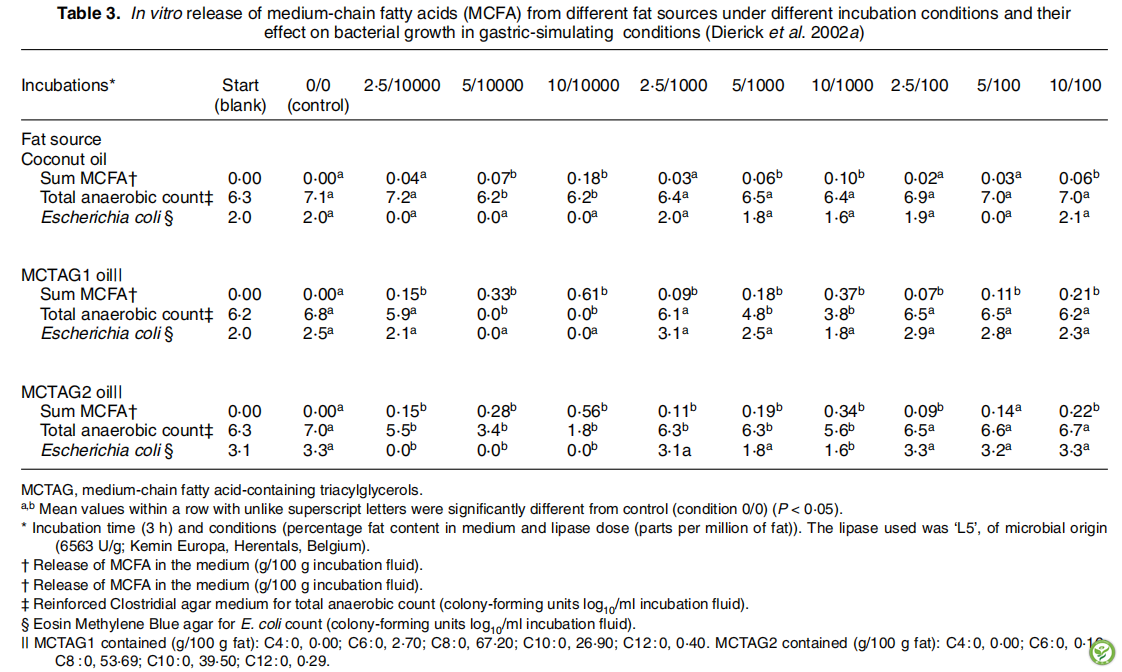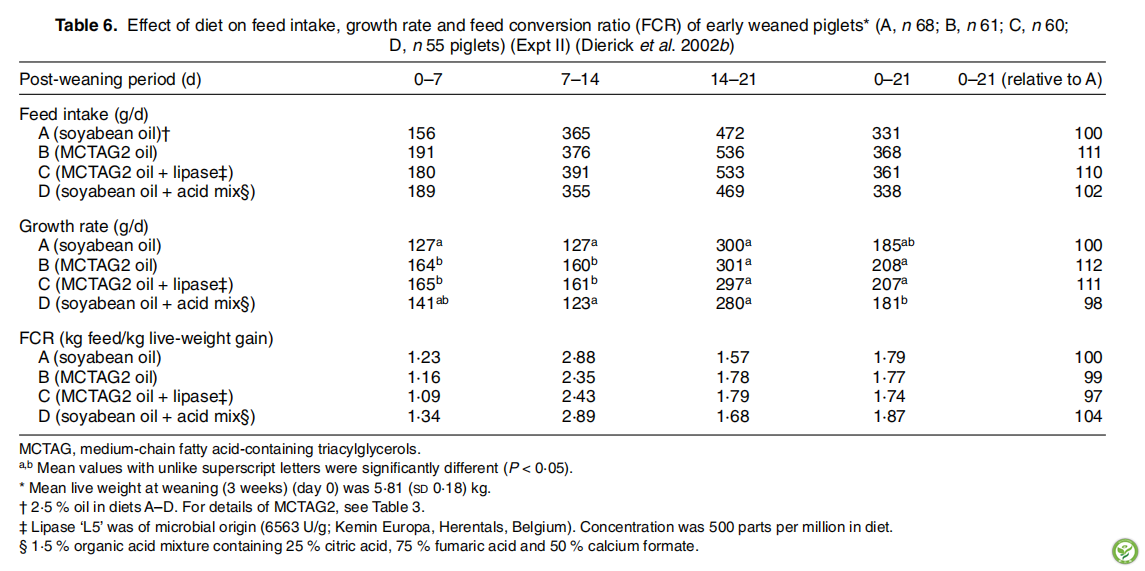The combined use of triacylglycerols containing medium-chain fatty acids and exogenous lipolytic enzymes as an alternative to in-feed antibiotics in piglets: concept, possibilities and limitations. An overview
作者:J. A. Decuypere and N. A. Dierick
Department of Animal Production, Faculty of Agricultural and Applied Biological Sciences, Ghent University, Proefhoevestraat 10, B-9090 MELLE, Belgium
来源:Nutrition Research Reviews (2003), 16, 193–209
翻译:肠动力研究院 梁琦
【摘要】为寻找禁止饲用的抗生素的替代品,基于在仔猪胃和近端小肠做的对含有中链脂肪酸的甘油三酯(MCTAG)和脂肪酶催化二酰甘油,单酰甘油的产物和中链脂肪酸(MCFA)的研究提出了一个概念。众所周知,MCFA具有强抗菌性,但由于其特殊的气味和味道而难以被利用。这些问题可以通过体内生成MCFA来克服。以典型的抗菌生长促进剂或有机酸作为阳性对照,该法在体外进行测试并在体内进行仔猪的胃插管实验和在实际猪场生产条件下得到验证,包括对动物生产性能的影响。此外,本文报道了新陈代谢和日粮对对MCTAG的营养利用(例如,对消化生理学,肠道菌群,采食量,性能,胴体组成)的影响。为完善此概念,文章论述了机体的十二指肠脂肪酶、原料中的内源植物脂肪酶以及外源添加到饲料中的脂肪酶的作用。本综述阐明了MCFA与一般抗生素对抑制菌群(总菌群,革兰氏阳性菌群,革兰氏阴性菌群,可能的病原体)繁殖的相似功能和前肠上皮组织形态。这些观点被认为是获得最佳生长性能的基础。此外,这些天然的抗菌剂对人或动物几乎没有或没有毒性,并且不会引起残留和交叉耐药性的产生。研究表明天然的抗菌剂是饲料中抗生素的有价值的替代品,它不仅能够促进生长,甚至还能够用于预防和治疗胃肠疾病。
【关键词】动物饲料;抗生素;肠道菌群;中链脂肪酸;脂肪酶
以下是实验中相关图表
表1:一些含中链脂肪酸的脂肪源(g/100g脂肪酸)的平均脂肪酸组成(文献数据的平均值和作者自己的结果)

表2:哺乳动物和家禽十二指肠脂肪酶活性的分布和解剖部位*(主要是Moreau等人,1988年之后)

表3:在不同培养条件下不同脂肪源体外释放的中链脂肪酸(MCFA)及其在胃模拟条件下对细菌生长的影响(Dierick等,2002a)

表4:通过插胃管喂食不同食物的仔猪的胃内容物中非酯化和总脂肪酸(FA)含量,总水解度(DH)和微生物群数(每次处理4头仔猪; Expt I)(Dierick等,2002b)

表5:日粮对断奶仔猪胃内容物中非酯化和总脂肪酸(FA)含量及总水解度(DH)的影响;对胃和十二指肠菌群的影响(每次处理5头仔猪)(Expt II)(Dierick等,2002b)

表6:日粮对早期断奶仔猪采食量、生长速度和饲料转化率(FCR)的影响*(A,n 68; B,n 61; C,n 60; D,n 55仔猪)(Expt II)(Dierick等.2002b) 
表7:饲喂萼距花属植物种子和脂肪酶对早期断奶仔猪(每次处理15头仔猪)的动物性能的影响(Expt III)(Dierick等.2003)

表8:饲喂萼距花属植物种子和脂肪酶对断奶仔猪近端小肠的平均绒毛高度(VH),隐窝深度(CD)(μm)和上皮绒毛细胞内淋巴细胞数(IEL)的影响(每个处理5头仔猪) (Expt III)(Dierick等.2003)

启示
在过去的十年中,许多研究都涉及MCTAG在人类和动物营养中的应用,特别是对仔猪的使用。然而,几乎没有把其作为一种潜在的在合适的脂肪酶的作用下在仔猪体内的胃部和前肠中抗菌剂的研究。
本综述阐明了MCFA与一般抗生素对抑制菌群(总菌群,革兰氏阳性菌群,革兰氏阴性菌群,可能的病原体)繁殖的相似功能和前肠上皮组织形态。这些天然的抗菌剂对人或动物几乎没有或没有毒性,可以作为饲料中抗生素的有效替代品。
相关酶释放产生的MCFA,最终与来自TAG的含MCFA的单甘酯在肠道前端结合,优于用非酯化的有机酸或非酯化的MCFA或它们的盐,动物采食饲料时能够避免异味和干扰酸碱平衡的失调。
然而,在应用这一概念时,应非常慎重选择饲料原料和脂肪酶,并需要做进一步研究。
Abstract
In the search for alternatives to banned in-feed antibiotics, a concept was developed based onstudies with medium-chain fatty acid-containing triacylglycerols (MCTAG) and selected lipases
for in situ generation of diacylglycerols, monoacylglycerols and medium-chain fatty acids (MCFA) in the stomach and proximal gut of piglets. MCFA are known to have strong antibacterial properties but can hardly be used as such because of their repellent odour and taste. Those problems could be overcome by the generation of MCFA in situ. The concept was tested in vitro and validated in vivo with gastric-cannulated piglets and under field conditions, including effectson zootechnical performance, with classical antibacterial growth promoters or organic acids acting as positive controls. Furthermore, the metabolic and dietary constraints on the nutritionaland nutritive use of MCTAG and/or MCFA (for example, the effects on digestive physiology,gut flora, feed intake, performance, carcass composition) are reviewed. The role of natural preduodenal lipase activity, the presence of endogenous plant lipase activity in raw materials and the feasibility for exogenous lipase addition to the feed are discussed, in order to optimize the concept. The present review illustrates the similarity of the action of MCFA and commonly used antimicrobials on the flora (total flora, Gram-positive flora, Gram-negative flora, potential pathogens) and epithelial morphology and histology in the foregut. These observations are believed to be the basis for obtaining optimal growth performances. In addition, these naturally
occurring antimicrobial agents have little or no human or animal toxicity and induce no problems of residues and cross-resistance induction. They are proposed as a valuable alternative to in-feed antibiotics, used for growth promotion, and even for the preventive and curative treatment of gastrointestinal diseases.
Keywords:Animal feeds: Antimicrobials: Gut flora: Medium-chain fatty acids: Lipase
Conclusion
During the last decade a lot of research has been directed to the use of MCTAG in human and animal nutrition, especially for piglets. Almost no research has been focused, however, on their use as a potential source of antimicrobial compounds, when liberated in situ in the stomach and foregut by appropriate lipases
The present review illustrates similarly strong activity of MCFA and the classical antimicrobial growth promoters and therapeuticals on the gut flora (total flora, Gram-positive flora, Gram-negative flora, potential pathogens) especially in the stomach and the foregut, as well as on the gut function of piglets. This means that these naturally occurring antimicrobial agents, which have little or no toxicity, can be an effective alternative to in-feed antibiotics
A progressive enzymic release of MCFA, eventually combined with MCFA-containing monoacylglycerols from TAG, in situ in the foregut, seems to be preferable to the supplementation of the feed with non-esterified classical organic acids or non-esterified MCFA or their salts, avoiding taste aversion and disturbance of the acid–base balancein the animal
However, when applying this concept, the choice of feedstuffs and lipases should be done very carefully and needs further exploration
如您需原文,请联系本文作者和出版方,或请垂询肠动力研究院。本网站发布的所有资料将尽最大可能注明出处、作者及日期,如无意中侵犯了您的知识产权,请来信及时告知,我们将立即予以删除。
All information released by the WeChat Official Account will do its best to indicate the source, author and date. If we inadvertently infringe on your intellectual property, please inform us in time and we will delete it immediately.







